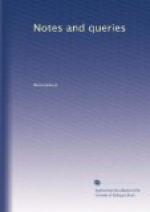Audley End, Jan. 9. 1850.
BRAYBROOKE.
Boduc or Boduoc on British Coins.—I observe there is a prevailing opinion that the inscription on the British coin, “Boduc or Boduoc,” must be intended for the name of our magnanimous Queen Boadicea. I am sorry to cast a cloud over so pleasant a vision, but your little book of QUERIES tempts me to throw in a doubt.
Although the name Budic is not met with in the pedigrees of England, commonly given by Welsh heralds, yet it is often found among the families of the Welsh in Brittany, and as they are reported to be early descendants of the Welsh of England, there can be little doubt that the name was once common in England. I beg leave, therefore, to query, Whether the inscription is not intended for a Regulus of Britain of that name?
P.
The Origin of the word Snob.—Can any of your valuable correspondents give me the origin or derivation of the word Snob?
When, and under what peculiar circumstances, was it first introduced into our language?
In the town in which I reside, in the north of England, the word Snob was formerly applied to a cobbler, and the phrase was in use, “Snip the tailor, and Snob the cobbler.”
I cannot discover how and why the word Snob was enlarged into its present comprehensive meaning.
Explanations of many of the slang phrases met with in the dramatic works of the last century, such as, “Thank you, sir, I owe you one,” “A Rowland for an Oliver,” “Keep moving, dad,” &c. &c. would perhaps give much light upon the manners of the times, and an interesting history might be compiled of the progress of slang phrases to the present day.
ALPHA.
Mertens, Martins, or Martini, the Printer.—Can any of your correspondents inform me what was really the surname of Theodoric Mertens, Martins, or Martini, the printer of Louvain, and who {186} was a friend of Erasmus? In a small volume of his, now before me, printed in 1517, the colophon gives: “Lovanii apud Theodoricum Martinum anno MDXVII mense April;” while, on the reverse of the same leaf, is a wooden block, of his device, occupying the whole page, and beneath it are inscribed the words “Theodoricus Martini.” This appears to put Mertens out of the question.
W.
Queen’s Messengers.—I should esteem it a favour conferred if any of your readers could give me any memoranda touching the early origin of the corps now termed Queen’s Messengers, the former “Knightes caligate of Armes.” The only mention that I have read of their origin is a brief notice in Knight’s London, No. 131. p. 91; but doubtless there exists, did I know what works to consult, many more voluminous a history of their origin and proceedings than the short summary given in the work of Mr. Knight. In whose reign were they first created? and by whom were they appointed? In fact, any data relating to their early history would very much oblige,




